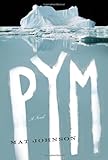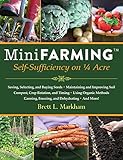
 I started my first-ever vegetable garden this year at a small cottage my husband and I are fixing up an hour and a half outside New York City. I had no idea what I was doing and the anxiety of inexperience led me to nearly replace my habitual novel and short-story reading with a compost heap of gardening and how-to books. Here’s what I learned: I am on trend. The marketplace is soggy with pretty guides for beginners by green-thumb gurus and back-to-the-land life stylists. And the books are so pretty! I bought and read a lot of these books as if they contained the secret map to finding the secret garden. But, to be honest, I still can’t say I know much about growing food. And though I made some salads, my garden is not aesthetically pleasing. This is just to say, that a lot of these books are heavy on the glossy photographs and inconsistent on advice. I learned from these books that the way you learn to garden is to try and fail at gardening. I was great at Japanese eggplant, not so great with heirloom tomatoes. I smothered the broccoli by planting the cucumber too close, but I grew lovely peppers. Not a single garden book warned me about the aggressive, almost pernicious, nature of the cucumber. I did find one book more straightforward and informative than the rest. Brett L. Markham’s Mini-Gardening: Self-Sufficiency on a ¼ Acre. It’s the book I will look at again next year. It’s more of a basic agriculture book than a plant-this-vegetable-next-to-that-vegetable book. Besides gardening, most of my 2011 reading was research focused. I had my nose buried in Edgar Allan Poe and Poe-related scholarship for a book I’m working on, all the research is stuff that’s been around, except for Mat Johnson’s excellent novel Pym. Pym takes a depressingly hilarious look at race in America by following an African-American scholar who is fixated on Poe’s only novel, The Narrative of Arthur Gordon Pym, on a wild-Poe chase to Antarctica.
I started my first-ever vegetable garden this year at a small cottage my husband and I are fixing up an hour and a half outside New York City. I had no idea what I was doing and the anxiety of inexperience led me to nearly replace my habitual novel and short-story reading with a compost heap of gardening and how-to books. Here’s what I learned: I am on trend. The marketplace is soggy with pretty guides for beginners by green-thumb gurus and back-to-the-land life stylists. And the books are so pretty! I bought and read a lot of these books as if they contained the secret map to finding the secret garden. But, to be honest, I still can’t say I know much about growing food. And though I made some salads, my garden is not aesthetically pleasing. This is just to say, that a lot of these books are heavy on the glossy photographs and inconsistent on advice. I learned from these books that the way you learn to garden is to try and fail at gardening. I was great at Japanese eggplant, not so great with heirloom tomatoes. I smothered the broccoli by planting the cucumber too close, but I grew lovely peppers. Not a single garden book warned me about the aggressive, almost pernicious, nature of the cucumber. I did find one book more straightforward and informative than the rest. Brett L. Markham’s Mini-Gardening: Self-Sufficiency on a ¼ Acre. It’s the book I will look at again next year. It’s more of a basic agriculture book than a plant-this-vegetable-next-to-that-vegetable book. Besides gardening, most of my 2011 reading was research focused. I had my nose buried in Edgar Allan Poe and Poe-related scholarship for a book I’m working on, all the research is stuff that’s been around, except for Mat Johnson’s excellent novel Pym. Pym takes a depressingly hilarious look at race in America by following an African-American scholar who is fixated on Poe’s only novel, The Narrative of Arthur Gordon Pym, on a wild-Poe chase to Antarctica.
 I do want to mention one book that had nothing to do with my laughable attempts at agriculture or my Poe studies, and that’s Edmund De Waal’s memoir The Hare with Amber Eyes. De Waal is a world-famous ceramicist who inherited a collection of 264 Japanese netsuke from his great uncle Iggie. He becomes fixated on uncovering the story behind the delicate wood and ivory carvings and determines to trace their history through his family. His research leads him back several centuries and ends up taking the reader on an introspective, tragic, and ultimately romantic journey through many eras, wars, and the Holocaust. Along the way his family ancestors rub shoulders and make appearances in Proust’s À la recherche du temps perdu, in a painting by Renoir, and in the work of other artist intelligentsia from the Belle Époque. It’s a remarkable secret history discovered through De Waal’s love of objects. I was swept away by this book and that just doesn’t happen as often as I’d like it to these days.
I do want to mention one book that had nothing to do with my laughable attempts at agriculture or my Poe studies, and that’s Edmund De Waal’s memoir The Hare with Amber Eyes. De Waal is a world-famous ceramicist who inherited a collection of 264 Japanese netsuke from his great uncle Iggie. He becomes fixated on uncovering the story behind the delicate wood and ivory carvings and determines to trace their history through his family. His research leads him back several centuries and ends up taking the reader on an introspective, tragic, and ultimately romantic journey through many eras, wars, and the Holocaust. Along the way his family ancestors rub shoulders and make appearances in Proust’s À la recherche du temps perdu, in a painting by Renoir, and in the work of other artist intelligentsia from the Belle Époque. It’s a remarkable secret history discovered through De Waal’s love of objects. I was swept away by this book and that just doesn’t happen as often as I’d like it to these days.
 While writing this I also realized that 2011 was the rare year for me where I read more non-fiction than fiction. And by rare, I probably mean that it was a unique event in my life. It was unsettling. My favorite novel I read this year was Jennifer Egan’s A Visit from the Goon Squad. (I know, I know. It came out a while ago, and everyone loves it, and the Pulitzer). I found the book to be breathtaking and also unsettling – particularly Egan’s global warming future forecasting – perhaps this aspect of Goon Squad also encouraged my decision to start growing food. So I guess this year in reading taught me that I need more goon squads and less green thumbs in my life. I’m just no good without a good story.
While writing this I also realized that 2011 was the rare year for me where I read more non-fiction than fiction. And by rare, I probably mean that it was a unique event in my life. It was unsettling. My favorite novel I read this year was Jennifer Egan’s A Visit from the Goon Squad. (I know, I know. It came out a while ago, and everyone loves it, and the Pulitzer). I found the book to be breathtaking and also unsettling – particularly Egan’s global warming future forecasting – perhaps this aspect of Goon Squad also encouraged my decision to start growing food. So I guess this year in reading taught me that I need more goon squads and less green thumbs in my life. I’m just no good without a good story.
More from A Year in Reading 2011
Don’t miss: A Year in Reading 2010, 2009, 2008, 2007, 2006, 2005
The good stuff: The Millions’ Notable articles
The motherlode: The Millions’ Books and Reviews
Like what you see? Learn about 5 insanely easy ways to Support The Millions, The Millions on Twitter, Facebook, Tumblr.










